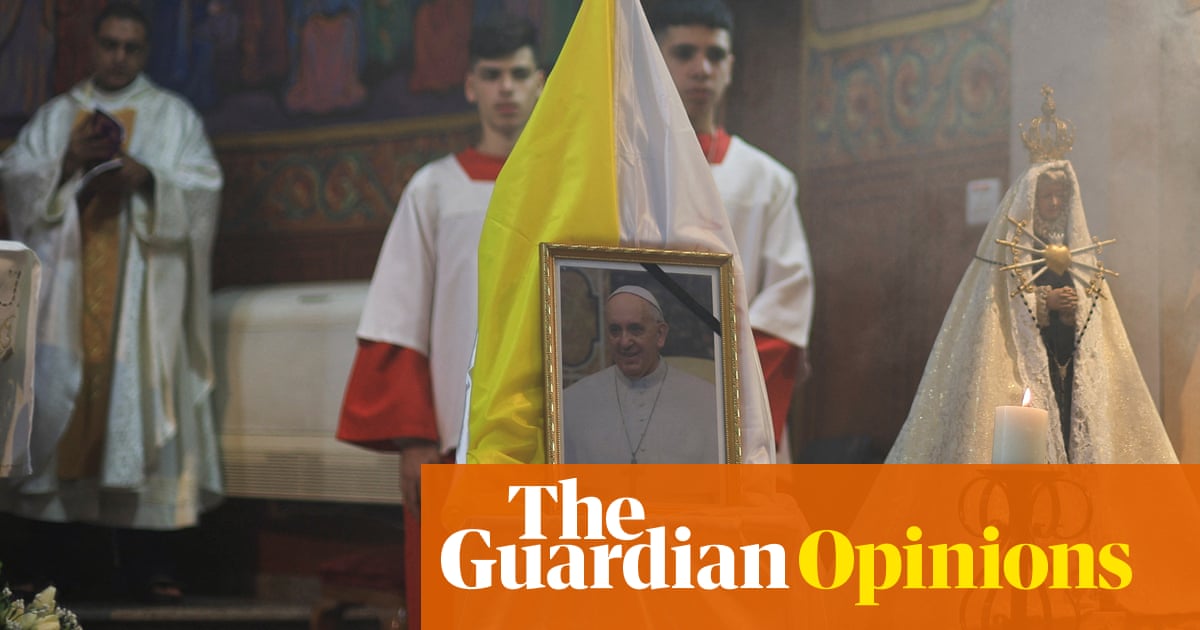The deaths of major public figures can provoke the most grotesque outpourings of hypocrisy. So it goes forPope Francis, now lauded by leaders and media outlets that were complicit in the very evils he condemned. “Pope Francis was a pope for the poor, the downtrodden and the forgotten,” said Keir Starmer, a prime minister who stripped the winter fuel payment from many vulnerable pensioners before launching an assault on disability benefits predicted to driveup to 400,000 Britonsinto poverty. “He promoted … an end to … suffering across the globe,”wrote Joe Biden, enabler of Israel’s genocidal assault on Gaza.
Indeed, the fate of Gaza seemed to preoccupy the pope’s final years. In hislast Easter address, he condemned the “death and destruction” and resulting “dramatic and deplorable humanitarian situation” – a powerful sermon that hardly any western media outlets covered. Indeed, you will struggle to find much prominent coverage of any of his courageous statements on Gaza, such as: “This is not war. This is terrorism.” In hisfinal published piece,the pope reiterated his support for a Palestinian state, declaring: “Peace-making requires courage, much more so than warfare.”
Starmer noted Pope Francis’s work with “Christians around the world facing war, famine, persecution and poverty”. He made no reference, however, to how the pope rang Gaza’s only Catholic church every day to offer solidarity and prayers – or how he rightly feared for a Christian community that faces erasure after having lived in Gaza for more than 1,600 years.
Islamophobia has served a pivotal role in Palestinian life being stripped of any worth or meaning. But that dehumanisation also transcends religion, because there was little western outrage over the Israeli attack on Gaza’sSaint Porphyrius church, or the recent strike on the Anglicanal-Ahli Arab Baptist hospital, or the slaughter of many Christians, among them the elderlymother and her daughterwho were shot dead by an Israeli sniper in the Holy Family church on the eve of Christmas 2023. That was the church the pope rang each day;its school was attackedby the Israeli military last July.
Britain was no idle bystander.The “death and destruction” deplored by the pope includes the bombs that rained down on Gaza from F-35 jets – and Britain supplies theircrucial components. In his final book, thepope noted: “According to some experts, what is happening in Gaza has the characteristics of a genocide.” Yet the UK government refuses to describe a single Israeli obscenity as a “war crime” – recall when foreign secretary David Lammy wasreprimanded by No 10for simply stating that Israel had broken international law.
The passing of public figures is invariably politicised in one of two ways. In cases like that of Margaret Thatcher, the death entrenches political divisions, and critics are treated as indecent and disrespectful if they draw attention to dire legacies. If the dead were respected figures who dissented from the status quo during their lifetimes, then they face instead having their views posthumously sanitised. That was the fate of Nelson Mandela, who famously declared: “We know too well thatour freedom is incompletewithout the freedom of the Palestinians.” Again, those who point to the authentic beliefs of the deceased risk being denounced as seeking to cause division at a time of grief.
In a perverse way, there is something almost refreshing about the honesty of far-right US politician Marjorie Taylor Greene,who tweeted, in seeming reference to the pope: “Today there were major shifts in global leaderships. Evil is being defeated by the hand of God.” An astonishingly offensive thing to say. But how much more disrespectful is it than skirting around the substance of the pope’s beliefs and courageous stands, instead offering generalised platitudes?
Indeed, this was why the pope’s role was so important. The west is in the grip of the most extreme assault on free speech since McCarthyism in the 1950s, with those who speak out against Israel’s genocide being deplatformed, threatened, sacked, expelled from universities, assaulted by police officers, arrested, imprisoned and now evenfacing deportationfrom countries including Germanyand the US. In this environment, Pope Francis was a remarkable exception to the rule – and you cannot cancel the pope. Instead, political and media elites have sought to airbrush his record in death as in life – another plank of a strategy of eradicating scrutiny and accountability for this crime of historic proportions.
This was an unusual pope who denouncedunbridled capitalismand a “new colonialism”. Yet he was riddled with contradictions, offeringmore acceptancefor LGBTQ+ people than his predecessors while denouncing what he called “gender ideology” as the “ugliest danger” of our time. Popes, after all, are not democratically accountable: those of us who are non-believers hold that their selection is arbitrary rather than God’s will. Like any powerful figure without a democratic mandate, whether a pope is sympathetic to justice or otherwise is a matter of chance. And a benevolent pope does not negate the need for critiques of the Catholic church for, to take two examples, its treatment of child abuse and its opposition to contraception during the HIV/Aids pandemic in Africa.
But what matters is this. If you believe a monumental crime is happening in front of our eyes, then you should expect anyone with power and influence to take a stand. Let history record that this pope took a stand against one of the great horrors of our time.
Owen Jones is a Guardian columnist
Do you have an opinion on the issues raised in this article? If you would like to submit a response of up to 300 words by email to be considered for publication in ourletterssection, pleaseclick here.
